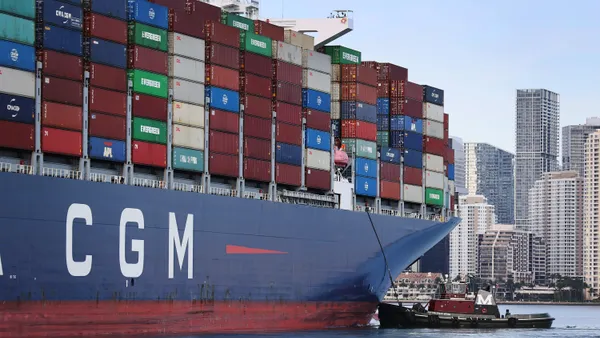Dive Brief:
- Delays at airport cargo handling operations are preventing the efficient movement of freight, another constraint in the global supply chain at a time when shippers rely more on air transport.
- Air cargo volumes in November fell 1.2% from October, according to Clive Data Services, an unusual drop as companies stock up for peak season. Congestion at ground handling facilities limited how much volume could move through the supply chain, said Niall van de Wouw, Clive's managing director, on a Wednesday media call.
- Ground handling issues aren't limited to one region. Freight forwarders have reported congestion at airports in Asia, Europe and the U.S. There are "countless examples of" cargo handlers being short-staffed and unable to build pallets in time for departing flights, van de Wouw said.
Dive Insight:
Shippers lean on airfreight to move their goods faster, giving the transport mode increased interest in a time of ocean congestion and production slowdowns. But what happens when air shipping is beset by its own delays?
Logistical workarounds include redirecting freight to better-staffed airlines or airports and to leverage truckload capabilities at origin and/or destination, C.H. Robinson said on its website.
On the airports' side, U.S. ground handlers have implemented earlier closeout times for exports to account for longer throughput times, Flexport said in a Nov. 30 market update. Meanwhile, terminals in Europe "are hiring additional temporary staff, implementing new processes and rethinking their infrastructure."
These measures don't make the current market conditions any easier for air cargo shippers, however. They've been grappling with limited capacity and elevated rates since the pandemic grounded many passenger flights in 2020, and November didn't provide much relief in those areas.
Compared to October, air cargo rates jumped 8% while capacity, still below pre-pandemic levels, rose 0.5%, according to Clive. A decline in volumes coinciding with little change in capacity and higher rates "seems like a paradox," van de Wouw said.
"What we think is happening is that the issues that are at so many airports on the ground is limiting the amount of air cargo volumes we can just move through the global supply chain," he added.
It's too soon to tell what effect the Omicron variant of COVID-19 will have on the air cargo market, according to van de Wouw.
European airlines have canceled flights out of South Africa since Nov. 26 in light of the variant's discovery by scientists there, according to a report from Everstream Analytics last week. Singapore Airlines converted some passenger services between Singapore and South Africa to cargo-only flights.
"A strong contingent of freighter operators has maintained routes to and from southern Africa, and other airlines may decide to turn passenger aircraft into cargo-only flights," Everstream's report said. "Despite this, air cargo capacity is expected to decrease by 30 percent over the next few days, particularly on the key trade lanes between South Africa and North America, Europe, and Asia."














